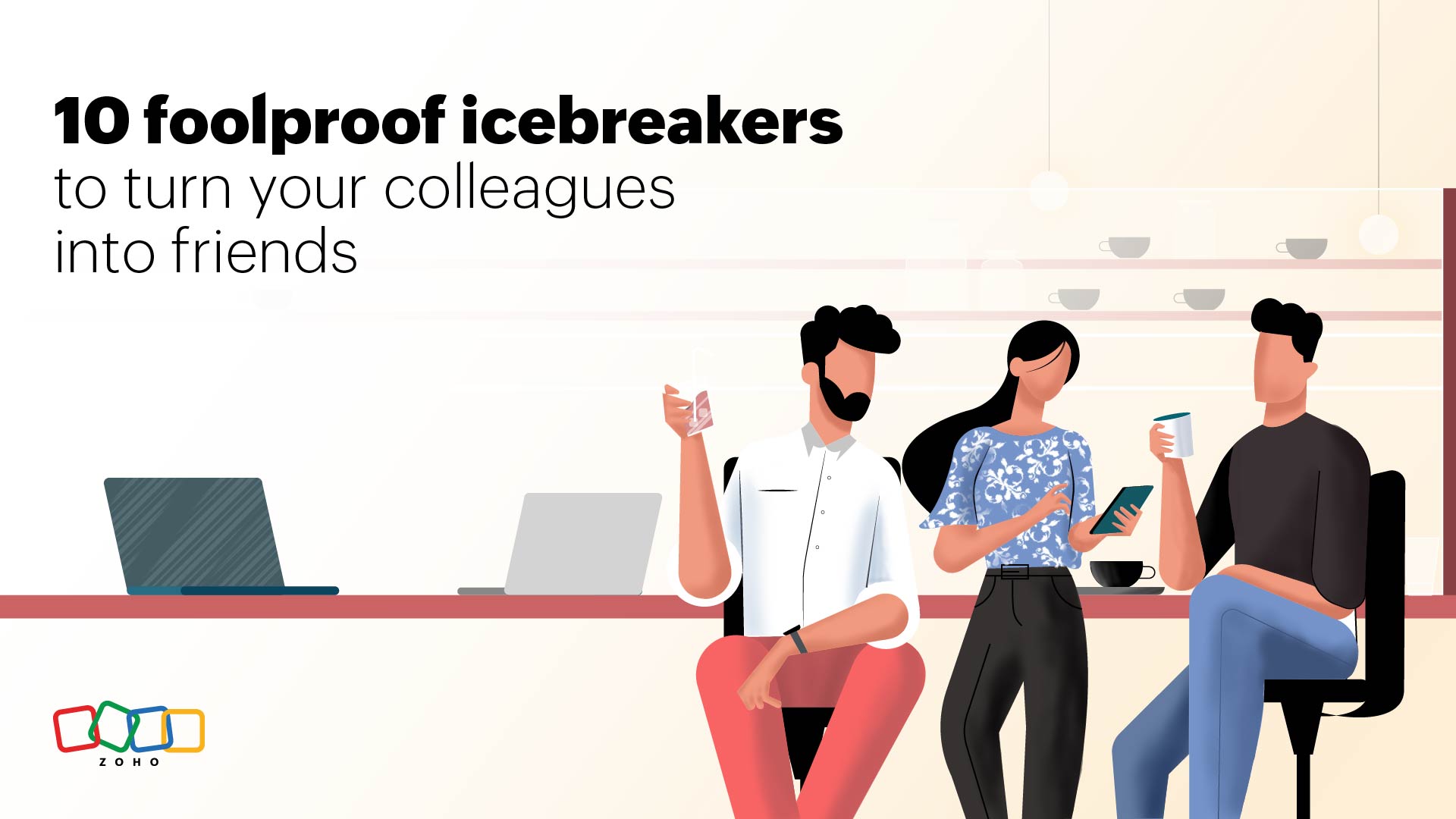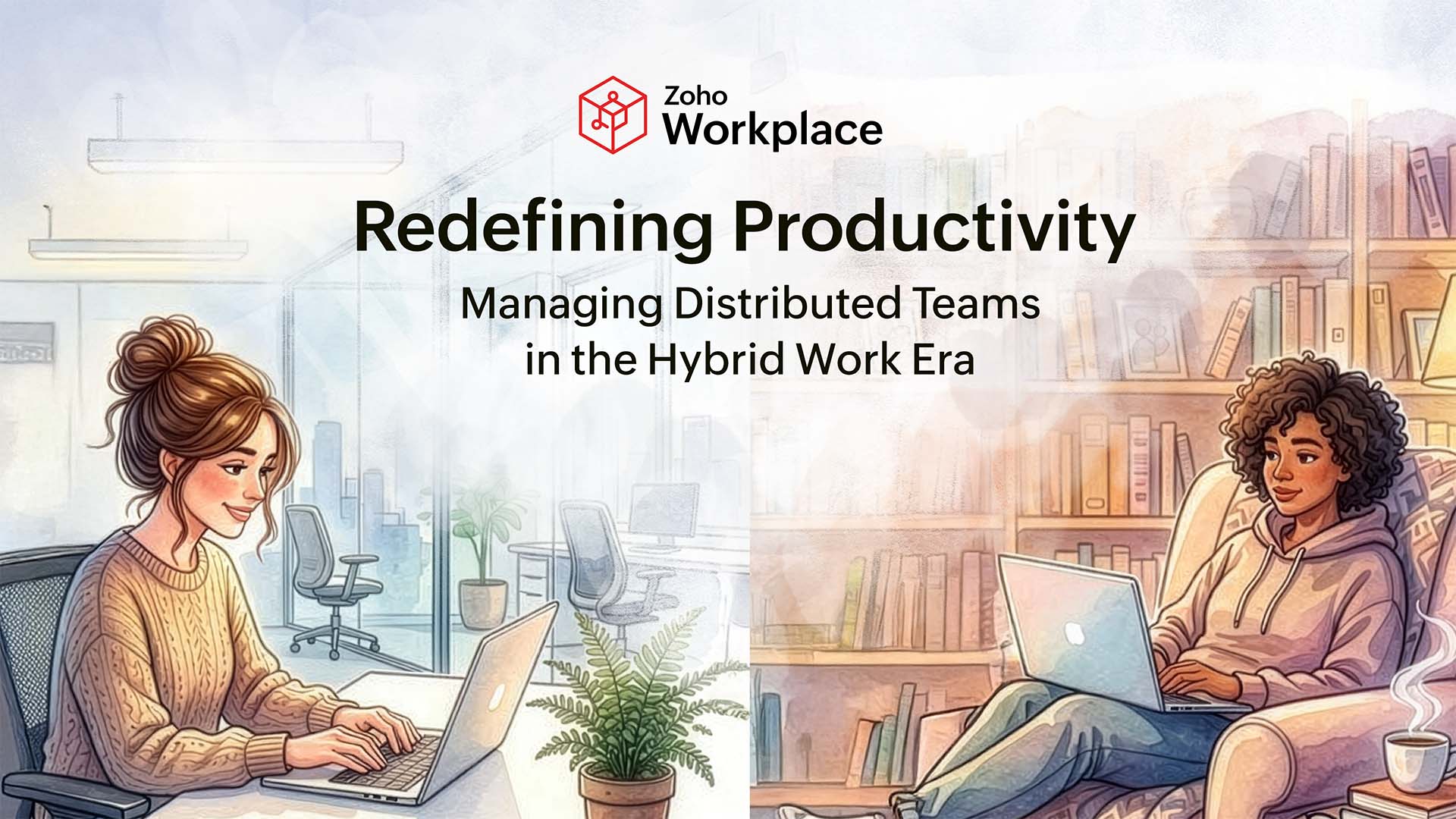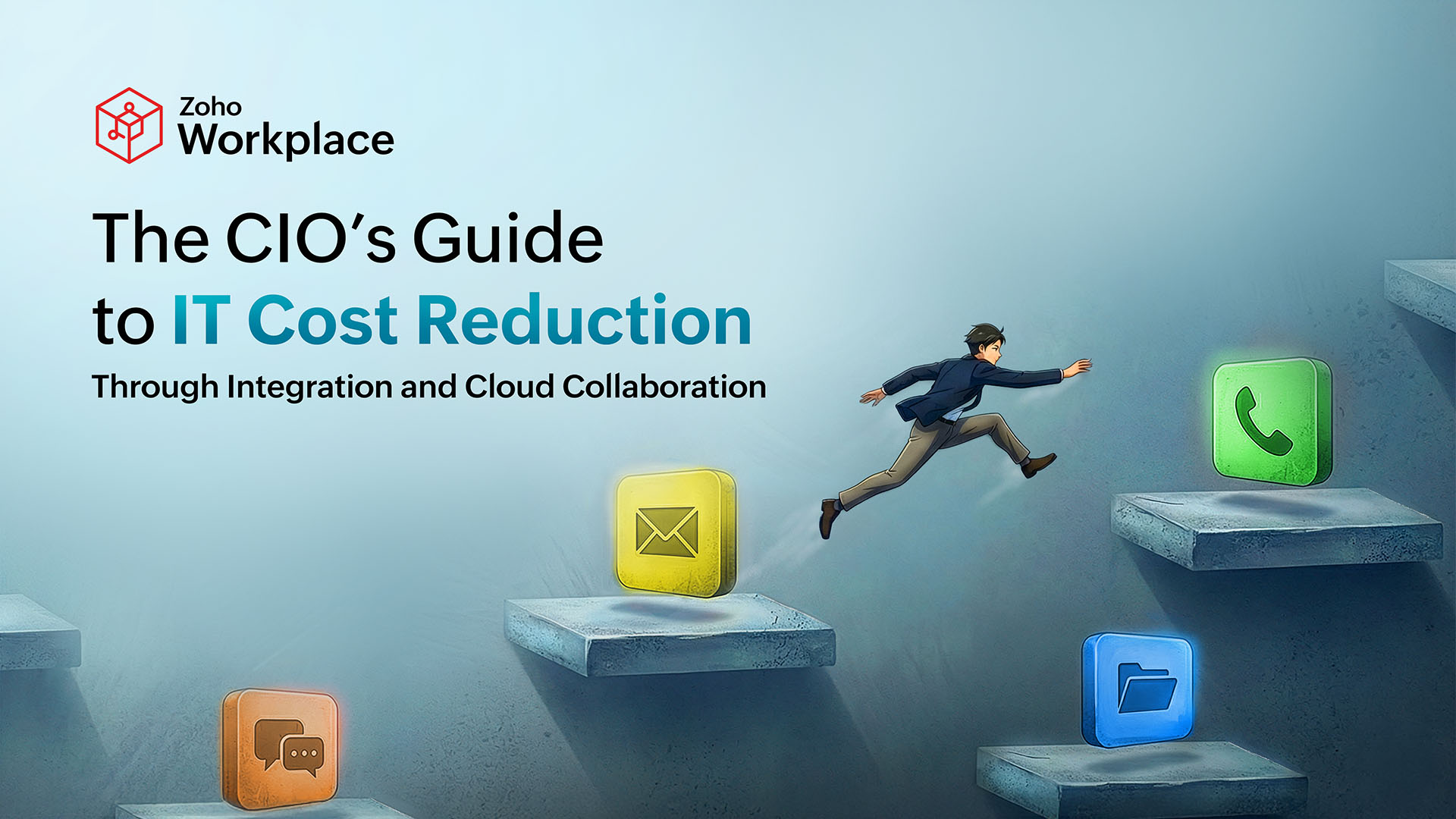- HOME
- All Products
- Collaboration
- Beyond “what do you do?”: 10 foolproof icebreakers to turn your colleagues into friends
Beyond “what do you do?”: 10 foolproof icebreakers to turn your colleagues into friends
- Published : March 12, 2024
- Last Updated : October 25, 2024
- 2.3K Views
- 9 Min Read
Maya, a new software engineer at a bustling tech company, found herself observing a group of colleagues huddled around the coffee machine. Laughter filled the air as they answered the "would you rather" question: beach vacation or mountain getaway? Maya felt a familiar pang of loneliness. While she enjoyed her work, she hadn't quite cracked the code of socializing with her peers.
So, Maya opted to remain at her desk, silently sipping her coffee and hoping someone might initiate a conversation about work-related topics, her area of comfort.
Later that day, after a team meeting, Sarah, a colleague, approached Maya. "Hey, I'm Sarah," she said warmly. "I noticed you're new. How are you finding things so far?"
This genuine question caught Maya off guard. This simple act of acknowledgment, offering a bridge to connect, gave Maya a feeling of genuine welcome. It was a small step, but it offered a glimmer of hope that maybe she could build connections within this new environment.
Fostering strong connections among team members can be a game-changer. One study reveals that nearly 50% of knowledge workers prioritize engaging and enjoyable work as the key to achieving their top performance. Beyond the technical skills and expertise that individuals bring to the table, a cohesive and collaborative team spirit is essential for optimal productivity, innovation, and overall success.
This is where icebreakers come into play, acting as powerful tools to spark social interactions and build lasting bonds with your colleagues.
What are icebreakers?
Icebreakers are conversation starters designed to ease social tension, initiate genuine interaction, and reveal hidden connections among colleagues.
How do icebreakers help you make genuine connections?
More than just small talk, icebreakers offer a strategic approach to:
Break the ice. Conversations flow naturally when you have a shared starting point. Icebreakers provide a safe and engaging way to initiate interaction, especially for introverts or those new to the group.
Discover hidden gems. Who knew your colleague was a salsa champion or a passionate home chef? Icebreakers reveal unexpected talents and interests, creating a sense of camaraderie and appreciation for individual diversity.
Promote communication. Icebreakers encourage active listening and open dialogue, creating a safe space for individuals to share their thoughts and experiences, leading to a more communicative work environment.
Stimulate creativity and collaboration. Engaging icebreakers can spark unexpected discussions and shared laughter. This creates a more relaxed and open environment, encouraging creative thinking and promoting stronger collaboration during projects.
Build trust and rapport. As colleagues share personal stories and insights, they begin to understand and appreciate each other's perspectives, fostering trust and mutual respect, which is the bedrock of strong team dynamics.
Beyond the initial benefits, incorporating icebreakers regularly can cultivate a culture of:
Psychological safety. Team members can feel comfortable taking risks, sharing ideas, and asking questions without fear of judgment, leading to enhanced creativity and problem-solving.
Employee engagement. When colleagues feel connected and valued, they’re more invested in their work, resulting in better productivity and overall well-being.
Positive work environment. Building strong connections creates a supportive and enjoyable work atmosphere where individuals feel valued and appreciated, increasing employee satisfaction.
Different kinds of icebreakers you can incorporate
Icebreakers don’t need to be forced or awkward. Here are a few exciting and professional ways to incorporate them into your workplace.
Theme-based icebreakers. Align questions with current events, holidays, or team-building activities. For example, during a brainstorming session, you could ask, "If you could invent one thing to improve our industry, what would it be?"
Interactive icebreakers. Encourage movement and participation with games or activities. Try "two truths and a lie," where each team member shares three statements, and the others guess the lie.
Technology-aided icebreakers. Utilize online tools like polls or quizzes with work-related questions or fun facts. This promotes engagement and breaks the physical barrier for remote team members.
If you want to establish connections with your colleagues but aren't sure how to, here are 10 foolproof icebreaker questions that are guaranteed to get the conversation flowing.

1 . "What’s your learning style?"
Each person has their own preferred style of learning. Some might benefit from presentations with clear visuals and diagrams, while others might appreciate detailed explanations and discussions. A few might thrive with hands-on experiences and interactive activities. That's why this icebreaker works.
- Reflecting on one's learning style encourages self-awareness and opens a window into an individual's thought process. This introspection can be insightful and even aid in self-discovery.
- By understanding how your colleagues learn best, you can adapt your communication and collaboration styles to cater to their individual needs.
- Learning styles are as diverse as the individuals themselves. By exploring these differences, teams can appreciate the unique perspectives and strengths that each member brings to the table.
2 . "What’s your favorite part about working at the company?"
This icebreaker is a versatile one, suitable for new hires, seasoned team members, and even cross-departmental interactions. Here's why it works.
- This question goes beyond generic pleasantries. It delves into personal experiences, allowing colleagues to share their genuine enthusiasm for specific aspects of the company or their work.
- Encouraging positive reflections on the workplace fosters a culture of gratitude. By sharing what they appreciate, colleagues subtly reinforce positive aspects of the company culture.
- It creates an opportunity for you to reciprocate by sharing your own favorite aspects of the company, creating a mutual exchange of experiences, and strengthening the bond.
3. "How do you manage deadlines?"
Deadlines are a universal experience in the professional world. We all approach deadlines differently. Some thrive under pressure, while others prefer a more methodical approach. That's why this icebreaker works wonders.
- You might discover a shared preference for to-do lists, a reliance on productivity apps, or even a love for setting unrealistic deadlines. These shared experiences can uncover common ground and kindle genuine conversation.
- By asking about deadline management, you gain insights into your colleagues' working styles and preferences. This understanding can improve team communication and collaboration, as you can modify your approach to better work with their unique rhythm.
- This exchange can initiate creative thinking and encourage individuals to refine their own strategies, ultimately leading to increased efficiency and success for the entire team.
4. "What do you do to beat stress?"
The beauty of this question lies in its open-ended nature. We all face stress, and navigating it in a professional setting is crucial. So, when the inevitable anxieties arise, why not use them as a springboard for connection? Here's how this icebreaker helps build bridges with your teammates.
- This simple question acknowledges the shared experience of stress, showing a vulnerability that can be disarming. It allows colleagues to step outside their professional personas and connect on a more relatable level.
- Responses can range from meditation and yoga to baking, gardening, or spending time with loved ones. This variety leads to natural conversation starters, prompting colleagues to share their personal experiences and strategies.
- By learning how colleagues manage stress, you might adopt a new coping method for yourself, or even offer support or encouragement to others.
5. "How do you resolve conflicts at work?"
This icebreaker offers unique insights into colleagues' communication styles, problem-solving approaches, and emotional intelligence—key factors in building strong work relationships. Here's why it works:
- Different approaches (e.g., compromise, collaboration, avoidance) showcase what people value in a work setting. This understanding induces respect and makes future interactions smoother.
- While approaches may differ, responses often highlight a shared desire for collaboration and productive solutions, laying the foundation for future rapport.
- Learning how colleagues diffuse challenging situations offers real-world value, potentially improving everyone's conflict management skills.
6. "Tell us something about yourself that would surprise most people who know you."
Here’s how this seemingly simple icebreaker question holds the power to spark genuine interest and forge connections.
- Instead of predictable responses, this question encourages introspection and delves into the untold stories that lie beneath the surface.
- It allows individuals to connect on a human level, fostering a sense of empathy, understanding, and respect for diverse backgrounds and perspectives.
- It prompts individuals to share unique experiences, hidden talents, or surprising passions, offering a glimpse into their inner world.
7. "What’s something you’ve always wanted to do but haven’t done yet? Why not?"
This icebreaker question is particularly beneficial for diverse teams or new employees. Here's how:
- This question delves beyond the surface level of work titles and invites colleagues to share aspirations, dreams, and even fears, offering a glimpse into their personal narratives.
- It naturally leads to deeper conversations as individuals explain their "why nots." Discussing obstacles, fears, and motivations creates a space for empathy, support, and shared experiences.
- It ignites curiosity about your colleagues' aspirations. Hearing about a dream to learn a new language, climb a mountain, or volunteer abroad can spark inspiration for you to do the same.
8. "What is one piece of advice you're glad you took?"
Everyone has received advice in their lives, making this question a relatable and accessible topic for everyone to participate in. Here's how this icebreaker question serves as a catalyst for discussions.
- This question goes beyond the mundane "how was your weekend?" and ignites engaging conversations that reveal values, experiences, and personal philosophies.
- Hearing diverse perspectives and experiences broadens everyone's horizons, creating a learning environment where colleagues can benefit from each other's journeys.
- Encourages mentors and mentees to share valuable advice during their sessions, fostering a supportive and growth-oriented environment.
9. "Do you prefer working from home or from the office?"
Create deeper conversations and get fascinating insights into a person's work style, priorities, and how they thrive. Here's how this icebreaker question breaks the ice and fuels team bonding.
- Beyond simply revealing a preference, this question encourages teammates to share why they gravitate towards one option or the other. This leads to a greater understanding of individual work habits, creating space for collaboration suited to different needs.
- Even if the team divides on preferences, it initiates a conversation around shared challenges, and how collaboration can be made seamless like a few tips to work from home efficiently, regardless of location.
- Let's be honest, everyone has an opinion on this (especially in the post-pandemic era).
10. "What’s one thing you’d like to improve about yourself?"
This question goes beyond the usual "safe" icebreakers that elicit predictable responses. Here's why this icebreaker question works.
- By asking this question, you tap into your colleagues' desire for growth and self-improvement. This shared interest in personal development creates a positive and relatable atmosphere where individuals feel comfortable acknowledging their vulnerabilities and aspirations.
- While individual responses will vary, the underlying desire for self-improvement is likely to be a shared thread. This common ground can spark meaningful conversations about shared challenges.
- By learning about each other's aspirations, team members can offer advice, share resources, and create a culture of collective growth.
Wait, there's more! Time for some fun icebreakers.
Don’t dismiss these just yet! Fun icebreaker questions are the perfect antidote to awkward silences. They create a lighthearted atmosphere where colleagues can interact outside their usual work roles, forging connections.
1. "Describe an uh-oh moment ."
We've all had them: those moments where everything seems to go hilariously, or perhaps not-so-hilariously, wrong. While they might feel embarrassing in the moment, sharing "uh-oh" stories can be a surprisingly effective icebreaker in a professional setting. "Uh-oh" moments are universally relatable. They tap into a shared human experience, regardless of job title or department.
Laughter truly is the best medicine. Sharing these stories can inject a dose of humor into the work environment, creating a lighter and more relaxed atmosphere. Many "uh-oh" stories involve individuals overcoming challenges and finding creative solutions to unexpected problems. Sharing these experiences can highlight hidden strengths, resourcefulness, and problem-solving skills within the team.
2. "What is a useless talent that you have?"
Professional settings often focus on showcasing strengths and qualifications. This question throws a playful curveball, inviting individuals to reveal a hidden quirk or unexpected skill.
You might discover a colleague who can wiggle their ears, recite pi to the 10th decimal, or impersonate famous movie characters with uncanny accuracy.
The "useless talent" reveals a unique facet of an individual's personality, sparking curiosity and conversation. You might find yourself asking follow-up questions like "How did you learn that?" or "Have you ever put it to use in an unexpected way?", establishing engagement and connection.
3. "What's the silliest thing you're willing to argue about?"
This icebreaker question doesn't demand deep introspection, but it invites witty comebacks and hilarious exchanges. That's why it works.
Our choice of silly arguments says a lot about our personalities and quirks. Is it the perfect way to eat a sandwich? The superiority of one popular artist over another? Or the correct placement of toilet paper? These lighthearted debates create a safe space to express our individual selves and discover unexpected common ground with colleagues.
From small talk to strong bonds
Incorporating strategic icebreaker questions into your work environment isn't just about avoiding awkward silence. It's a powerful tool to build stronger bonds between your teammates, enhance collaboration, and create a more positive work environment overall.
So, the next time you're looking to break the ice, try these icebreaker questions out that are both fun and functional, and watch your team thrive.
 Prashanth
PrashanthPrashanth is a Senior Product Marketer in the Zoho Workplace team who focuses more on Workplace productivity and how teams can work better. He loves bringing a creative element to his work. He enjoys traveling, writing, reading, and playing badminton.


